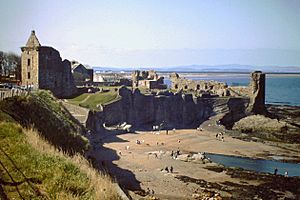Assured Scots facts for kids
Assured Scots were Scottish people who agreed to support England's plan for Mary, Queen of Scots to marry Edward VI of England. This happened during a war called the Rough Wooing, which lasted from 1543 to 1550. These Scots made special promises called "assurances." Some even received money from England. They had different reasons for doing this. Some wanted peace with England. Others supported the Protestant faith at a time when Scotland was mostly Catholic.
Contents
Why Scots Became Assured
The Battle and Captives
In October 1542, a Scottish army lost a battle at battle of Solway Moss. This battle was fought near Longtown in England. Many Scottish noblemen and landowners were captured.
These captured Scots made promises to Henry VIII, the King of England. Many were then allowed to go home. However, they had to send a family member as a hostage to England. They also promised to support England's plans. In March 1544, Henry VIII asked for some of these Scottish nobles to return to English captivity. This was because they were not following his wishes.
Mary, Queen of Scots, and the Marriage Plan
James V of Scotland died in December 1542. His baby daughter, Mary, became the new queen. Scotland was then ruled by Regent Arran.
In early 1543, Henry VIII asked his border leaders to start getting promises from Scots. These Scots would be "our friends" and help with the marriage plan. This plan was for Edward, Henry's son, to marry Queen Mary. Soon after, Arran's government agreed to the marriage plan. This was part of the Treaty of Greenwich.
However, the treaty failed. So, in May 1544, Henry VIII sent an army to burn Edinburgh. The English border leader, William Eure, then got more promises from Scottish borderers in June.
Promises After Pinkie
Some Scottish landowners made promises to support England after the battle of Pinkie in 1547. A writer named James Maitland mentioned his grandfather, Richard Maitland of Lethington. He said that "most part of the Gentlemen of Lothian, Merse, and Teviotdale did assure." But his grandfather "would not assure."
We know the names of about 950 Assured Scots. Most of them lived in areas affected by the war. These areas were near the borders or places like Dundee. Broughty Castle near Dundee had an English army living there.
Who Were Some Assured Scots?
Some important Assured Scots during the war included:
- Ninian Cockburn
- His older brother, John Cockburn of Ormiston
- Alexander Crichton of Brunstane
- Elizabeth Lamb, who was the Prioress of St Bathans
- Hugh Douglas of Longniddry
- The Armstrongs of Mangerton family
- George Turnbull of Bedrule
- James Douglas of Cavers
Changing Sides and Pardons
As the war went on, some Assured Scots changed their minds. They asked Arran's government for forgiveness. The government offered to drop treason charges for those who came forward.
English observers felt that the Assured Scots were not very helpful. For example, French troops could move easily in East Lothian. They were able to keep up the siege of Haddington without much trouble.
After a defeat at Haddington, an English officer named Thomas Fisher wrote about this. He wondered how French and German soldiers could pass through towns of the Assured Men at night. He said they didn't hear or report anything. He thought many of them knew what was happening but chose not to tell the English captain at Haddington.
When the war ended, only a few Assured Scots were punished. Some had to leave the country. But many were allowed to pay fines to be forgiven for their actions.
Protestant Reformers and Assurance
A Bond for Peace
One Scottish religious reformer, Henry Balnaves, wrote a form of an assurance promise in December 1546. It started by saying that God wanted peace between the two countries. It mentioned that the marriage between Prince Edward of England and Queen Mary of Scotland could unite them. It also said that the Scottish Parliament had agreed to this marriage. But then, the Governor and bad advisors, especially the Cardinal of Saint Andrews, broke the agreement.
Reasons for Assurance
Some Assured Scots were indeed linked to the Protestant reform movement. However, most of them were motivated by other things. They wanted to make a profit or simply survive during the war. They needed to stay safe when the enemy was nearby.
 | William M. Jackson |
 | Juan E. Gilbert |
 | Neil deGrasse Tyson |


